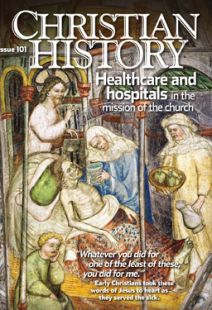Prescription for health
FOUNDED in the ninth century within a monastery’s “dispensary” (clinic and pharmacy), by the tenth the Medical School at Salerno had begun to gain widespread fame for the unrivaled expertise of its medical practitioners. The school’s twelfth– to thirteenth–century Regimen Sanitatis Salernitatum, printed in over 300 editions in many languages, drew from Islamic and classical Greek medical knowledge preserved for centuries at the Benedictine monastery of Monte Cassino. Like many “regimens,” this one gave advice on food and drink, exercise, and cleanliness, and explained the characteristics of the four humors and the diet and medical treatments appropriate to each:
76.
Rise early in the morn, and straight remember,
With water cold to wash your hands and eyes,
In gentle fashion reaching every member,
And to refresh your brain when as you rise,
In heat, in cold, in July and December,
Both comb your head, and rub your teeth likewise:
If dined, to stand or walk will do no harm.
Three things preserve the sight: Grass, Glass, and Fountains,
At Even springs, at Morning visit Mountains
86.
Six things, that here in order shall ensue,
Against all poisons have a secret power,
Pear, Garlic, Radish-roots, Nuts, Rape [the rapeseed plant], and Rue,
But Garlic chief; for they that it devour,
May drink, and care not who their drink do brew:
May walk in airs infected every hour.
Sith [since] Garlic then hath powers to save from death,
Bear with it though it make unsavory breath:
And scorn not Garlic, like to some that think
It only makes men wink, and drink, and stink.
91.
If in your drink you mingle Rue with Sage,
All poison is expelled by power of those,
And if you would withal Lust’s heat assuage,
Add to them two the gentle flower of Rose:
[Who] would not be sea-sick when seas do rage,
Sage-water drink with wine before he goes.
Salt, Garlic, Parsley, Pepper, Sage, and Wine,
Make sauces for all meats both coarse and fine.
Of washing of your hands much good doth rise,
‘Tis wholesome, cleanly, and relieves your eyes.
By John Harington
[Christian History originally published this article in Christian History Issue #101 in 2011]
From the seventeenth-century English translation by Sir John Harington (spelling modernized by Robert Richmond)Next articles
The despised class
Lepers came to be seen as called by God to a life of meritorious suffering and prayer
The EditorsThe charitable revolution
Why did the twelfth century bring a wave of new hospitals?
Adam J. Davis, adapted by Chris R. ArmstrongSupport us
Christian History Institute (CHI) is a non-profit Pennsylvania corporation founded in 1982. Your donations support the continuation of this ministry
Donate



